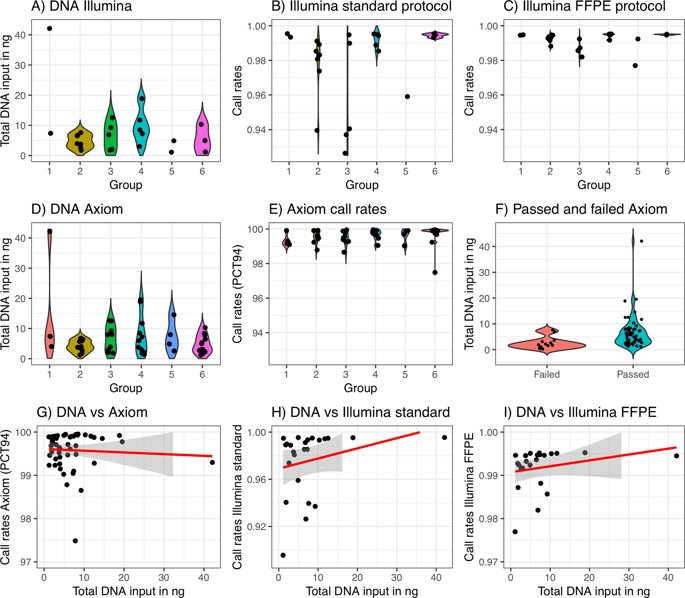European Journal of Human Genetics ( IF 5.2 ) Pub Date : 2019-11-12 , DOI: 10.1038/s41431-019-0543-x Trine B Rounge 1 , Marianne Lauritzen 1 , Sten Even Erlandsen 2 , Hilde Langseth 1 , Oddgeir Lingaas Holmen 3, 4 , Randi E Gislefoss 1

|
While genotyping studies are scavenging for suitable samples to analyze, large serum collections are currently left unused as they are assumed to provide insufficient amounts of DNA for array-based genotyping. Long-term stored serum is considered to be difficult to genotype since preanalytical treatments and storage effects on DNA yields are not well understood. Successful genotyping of such samples has the potential to activate large biobanks for future genome-wide association studies (GWAS). We aimed to evaluate genotyping of ultralow amounts of DNA from samples stored up to 45 years in the Janus Serum Bank with two commercially available platforms. 64 samples, with various preanalytical treatments, were genotyped on the Axiom Array from Thermo Fisher Scientific and a subset of 24 samples with slightly higher yield were genotyped on the HumanCoreExome array from Illumina. Our results showed that about 80% of the serum samples produced call rates with the Axiom arrays that would be satisfactory in GWAS. The mean DNA yield was 5.8 ng as measured with PicoGreen, 3–6% of recommended yield. The failed samples had on average lower input amounts of DNA. All serum samples genotyped on the HumanCoreExome with a standard and FFPE protocol produced GWAS satisfactory call rates, with mean 97.57% and 98.35% call rates, respectively. The mean yield was 10.65 ng, 6% of the recommendations. Successful array-based genotyping of ultralow DNA yields from serum samples stored up to 45 years is possible. These results demonstrate the potential to activate large serum biobank collections for future studies.
中文翻译:

来自长期存档血清样本的超少量 DNA 可产生高质量的基因型。
虽然基因分型研究正在寻找合适的样本进行分析,但大量血清集合目前未被使用,因为它们被认为无法为基于阵列的基因分型提供足够量的 DNA。长期储存的血清被认为难以进行基因分型,因为尚不清楚分析前处理和储存对 DNA 产量的影响。这些样本的成功基因分型有可能为未来的全基因组关联研究 (GWAS) 激活大型生物库。我们的目标是使用两个商用平台评估在 Janus 血清库中储存长达 45 年的样本中超少量 DNA 的基因分型。64 个样品,经过各种分析前处理,在 Thermo Fisher Scientific 的 Axiom Array 上进行了基因分型,在 Illumina 的 HumanCoreExome 阵列上对 24 个样本的子集进行了基因分型,产量略高。我们的结果表明,大约 80% 的血清样本使用 Axiom 阵列产生的检出率在 GWAS 中是令人满意的。使用 PicoGreen 测量的平均 DNA 产量为 5.8 ng,为推荐产量的 3-6%。失败的样本平均具有较低的 DNA 输入量。在 HumanCoreExome 上使用标准和 FFPE 方案进行基因分型的所有血清样本均产生了令人满意的 GWAS 检出率,平均检出率分别为 97.57% 和 98.35%。平均产量为 10.65 ng,为建议值的 6%。对储存长达 45 年的血清样本中的超低 DNA 产量进行成功的基于阵列的基因分型是可能的。


























 京公网安备 11010802027423号
京公网安备 11010802027423号